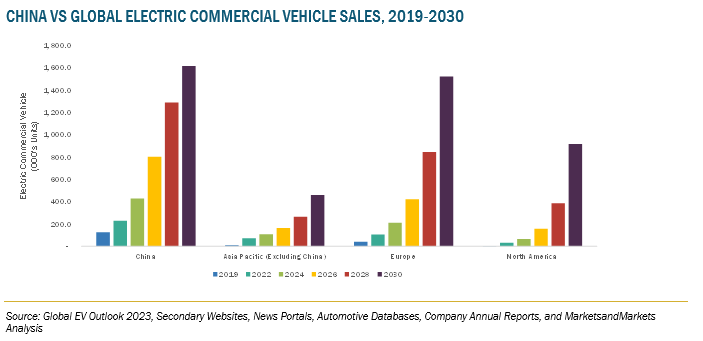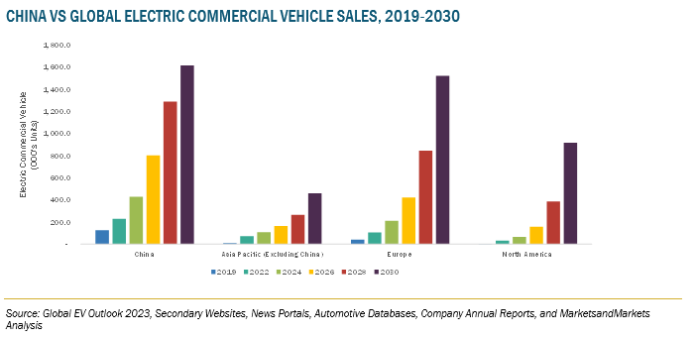The transportation industry is one of the most prominent contributors to worldwide emissions of greenhouse gases, and numerous countries are intensifying efforts to adopt electric commercial vehicles toward zero-emission electric alternatives. With impending government mandates targeting vehicle emissions, the automotive industry is transitioning towards adopting emission-free vehicles and advanced technologies to increase vehicle range in EVs. This shift underscores a pressing need for sustainable transportation solutions, prompting heightened investment and research into electric vehicle technology to meet regulatory requirements and environmental imperatives. Increasing e-commerce, logistics, delivery, and mobility growth in urban areas have significantly boosted the market for electric commercial vehicles, especially for electric pick-up trucks and electric vans, due to their wide applications in the e-commerce and logistics industries. Additionally, companies such as Mercedes-Benz Group AG (Germany), AB Volvo (Sweden), BYD (China), GM (US), Volkswagen (Germany), Scania AB (Sweden), and Peterbilt (US) are launching a new model in electric truck segment of electric commercial vehicle market which will support the market growth in the near future. For instance, In October 2023, Mercedes-Benz Trucks, the European division of commercial vehicle maker Daimler, premiered its battery-electric long-haul truck, eActros 600. The series production of this truck is planned for the end of 2024.
Further, increasing demand for emission-free public transport options in developed and emerging economies is projected to boost the electric bus segment in the near future. For instance, In January 2024, Yutong and BYD signed a contract to supply electric buses to the Italian cities of Bari and Taranto. Yutong will supply 99 electric buses to Bari, with a length ranging from 11.5 to 13 meters. On the other hand, BYD will supply 45 electric buses with a length of 18 meters to the city of Taranto. The manufacturers are focused on the launch of electric commercial vehicle models. The table below covers a few of the new models launched by key manufacturers.

Transitioning to electric commercial vehicle options can yield significant cost savings for businesses with lower operating costs due to cheaper electricity than diesel fuel, leading to long-term financial benefits and making it an attractive choice. Key OEMs such as BYD (China), Mercedes Benz Group AG (Germany), Yutong (China), AB Volvo (Sweden), and Ford Motor Company (US) have launched electric light trucks, electric vans, electric buses, electric medium and heavy-duty trucks in recent years.
 As per Atin Jain, Team Lead (Automotive and Transportation) at MarketsandMarkets Research, “The growth of electric commercial vehicle market is driven by factors such as government favorable policies, investment in ECV charging infrastructure, adoption of electric fleets for e-commerce and logistic, delivery and others end -use purpose. In addition, electric vehicles have lower operating costs due to the lower running cost of electricity compared to diesel/gasoline and have fewer maintenance requirements, resulting in a lower total cost of ownership over the vehicle’s lifespan. Ongoing advancements in battery technology, electric drivetrains, and a decrease in battery prices would support the adoption of electric commercial vehicles for a wider range of end-use applications.
As per Atin Jain, Team Lead (Automotive and Transportation) at MarketsandMarkets Research, “The growth of electric commercial vehicle market is driven by factors such as government favorable policies, investment in ECV charging infrastructure, adoption of electric fleets for e-commerce and logistic, delivery and others end -use purpose. In addition, electric vehicles have lower operating costs due to the lower running cost of electricity compared to diesel/gasoline and have fewer maintenance requirements, resulting in a lower total cost of ownership over the vehicle’s lifespan. Ongoing advancements in battery technology, electric drivetrains, and a decrease in battery prices would support the adoption of electric commercial vehicles for a wider range of end-use applications.


According to MarketsandMarkets research, the global electric commercial vehicle market is projected to reach 4,512.4 thousand units by 2030, starting from 812.9 thousand units in 2024, growing at a CAGR of 33.1%. Innovations in battery technology have led to increased energy density, longer driving ranges, and faster charging times, eliminating some of the primary concerns associated with ECVs end-use applications. Further, R&D activities are being carried out to enhance battery technology, reduce battery cost, decrease charge time, and increase vehicle range. With countries worldwide setting targets to reduce vehicle emissions, the demand for electric commercial vehicles will grow during the forecast period.
Electric commercial vehicles (ECVs) are revolutionizing various industries by offering efficient and sustainable transportation solutions tailored to specific end uses. In urban delivery and logistics, ECVs are preferred due to their quiet operation, zero-emission propulsion, and cost-effectiveness over distances. These vehicles are well-suited for last-mile delivery services, supporting companies in meeting stringent emission regulations implemented by the government. Various retail, logistics, and courier companies, such as DHL (Germany), UPS (US), FedEx (US), and Amazon (US), have included electric vehicles in their operations. For instance, in September 2023, FedEx announced the addition of 23 Mercedes-Benz eSprinter vans to its UK operations. Furthermore, ECVs find applications in public transportation, providing clean and reliable mobility options for commuters while lowering city carbon footprints. Thus, electric commercial vehicles are poised to play an increasingly pivotal role across diverse industries, driving a sustainable transportation revolution.


Source: marketsandmarkets




